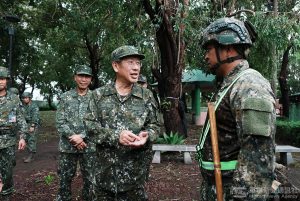Taiwan is at the epicenter of global geopolitical tensions and military conflicts. Since President Lai Ching-te assumed office, Taiwan has faced increasing military provocations and gray-zone operations from neighboring China, highlighting the urgent need for a strong defense strategy. In this critical situation, Lai’s appointment of Wellington Koo, a prominent human rights lawyer, as defense minister marked a significant and unprecedented decision. Koo is the first civilian without a military background to be entrusted with this role since Taiwan’s military reforms in 2000, which aimed to nationalize the armed forces.
Koo’s past leadership of Taiwan’s Judicial Reform Foundation (JRF) gained international recognition in early August, at the American Bar Association (ABA) Annual Meeting in Chicago, an event that gathers legal professionals from across the United States. The JRF earned the prestigious Justice Institutions Prize at the 2024 World Justice Challenge for organizing pro bono legal defense for participants in the 2014 Sunflower Movement.
This was Taiwan’s first attempt to participate in what is sometimes called the “World Cup” of the legal community. Notably, the JRF faced significant challenges in the registration process, as Taiwan was not even listed as a country in the online forms. This speaks to the broader difficulties Taiwan faces in participating in international organizations, making the award even more remarkable.
On August 6, the ABA went a step further by passing Resolution 700, which promotes Taiwan’s inclusion in the international system. This resolution supports U.S. government actions to integrate Taiwan into global institutions, aligning with the TAIPEI Act and the Taiwan Enhanced Resilience Act.
The passage of this resolution is a significant achievement, reflecting decades of advocacy by the Taiwan Bar Association, where Koo served as chairperson. This effort has been crucial in challenging the international legal community’s longstanding adherence to the One China policy, which has marginalized Taiwan since the Carter administration normalized relations with the People’s Republic of China in 1978.
Wellington Koo is undoubtedly one of Taiwan’s most influential human rights lawyers. But why is he the best choice to strengthen Taiwan’s defense capabilities?
To understand this appointment, it’s essential to consider Taiwan’s historical context. Before 1987, Taiwan endured 38 years of martial law, during which the military operated as a separate entity from society. Soldiers were indoctrinated with loyalty to a political party and the idea of unification with China, serving as tools of oppression against the Taiwanese people.
This legacy has left a deep-seated distrust of the military among the Taiwanese populace, discouraging young people from enlisting and creating a disconnect between the armed forces and society. This historical backdrop is key to understanding why Taiwan, despite its technological talent and socially conscious youth, struggles to attract individuals to its military.
Taiwan has ample defense funding and advanced weaponry, but what it truly needs is a defense system deeply integrated with civilian society. The military must become a place where the most capable and idealistic young people are eager to serve. For too long, Taiwan’s military has relied on authoritarian management styles, with lower-ranking soldiers and non-commissioned officers having little say in decision-making. Training focused on ceremonial drills, rather than on tactics involving modern technology or coordination with foreign militaries. These flaws have made the military unattractive to Taiwan’s youth, who see enlistment as a waste of time.
Since taking office, Koo has made immediate reforms, such as abolishing outdated practices like goose-stepping drills and bayonet fighting. These changes were unpopular among senior officers but welcomed by the rank and file. On August 7, Lai announced the enactment of the Military Human Rights Protection Act, a significant reform driven by Koo, ensuring the basic human rights of every soldier.
Koo’s commitment to human rights, exemplified by his mobilization of over 400 volunteer lawyers during the Sunflower Movement to provide legal defense against government crackdowns, has made him a symbol of resistance against authoritarian oppression and a guardian of people’s rights. His credibility and influence could inspire a new generation to support and engage with the military.
On a personal note, I first met Koo in 1996 as a first-year law student volunteering at the newly established JRF. In his late 30s, Koo was an active young lawyer within the organization. Together with generations of young legal professionals, we advocated against wrongful death penalty convictions, called for the abolition of the death penalty, pushed for military trial reforms, and protested China’s repression in Tibet, Xinjiang, and Hong Kong, while supporting Chinese human rights lawyers.
Koo was not just a brilliant lawyer but also an open-minded mentor deeply respected by the youth. I vividly recall a fundraising event where he dressed up as Elsa from Frozen, a memory that still makes me laugh. Never did I imagine that he would one day become Taiwan’s defense minister.
As China’s military threat intensifies, the world is closely watching how Taiwan strengthens its defense. Taiwan’s security relies not only on its own resilience but also on forging and maintaining strong international alliances. Koo, with his extensive international legal networks and solid reputation, is exceptionally well-positioned to garner global support for Taiwan’s defense.
Appointing a human rights lawyer as defense minister is a bold and strategic move, highlighting the need for leadership that can build a modern, robust military aligned with the nation’s values and backed by its people. This shift recognizes Taiwan’s role as a responsible actor in upholding international human rights and legal order, especially as China increasingly emerges as a disruptor. I believe this is why Taiwan needs a human rights lawyer as its defense minister.

































